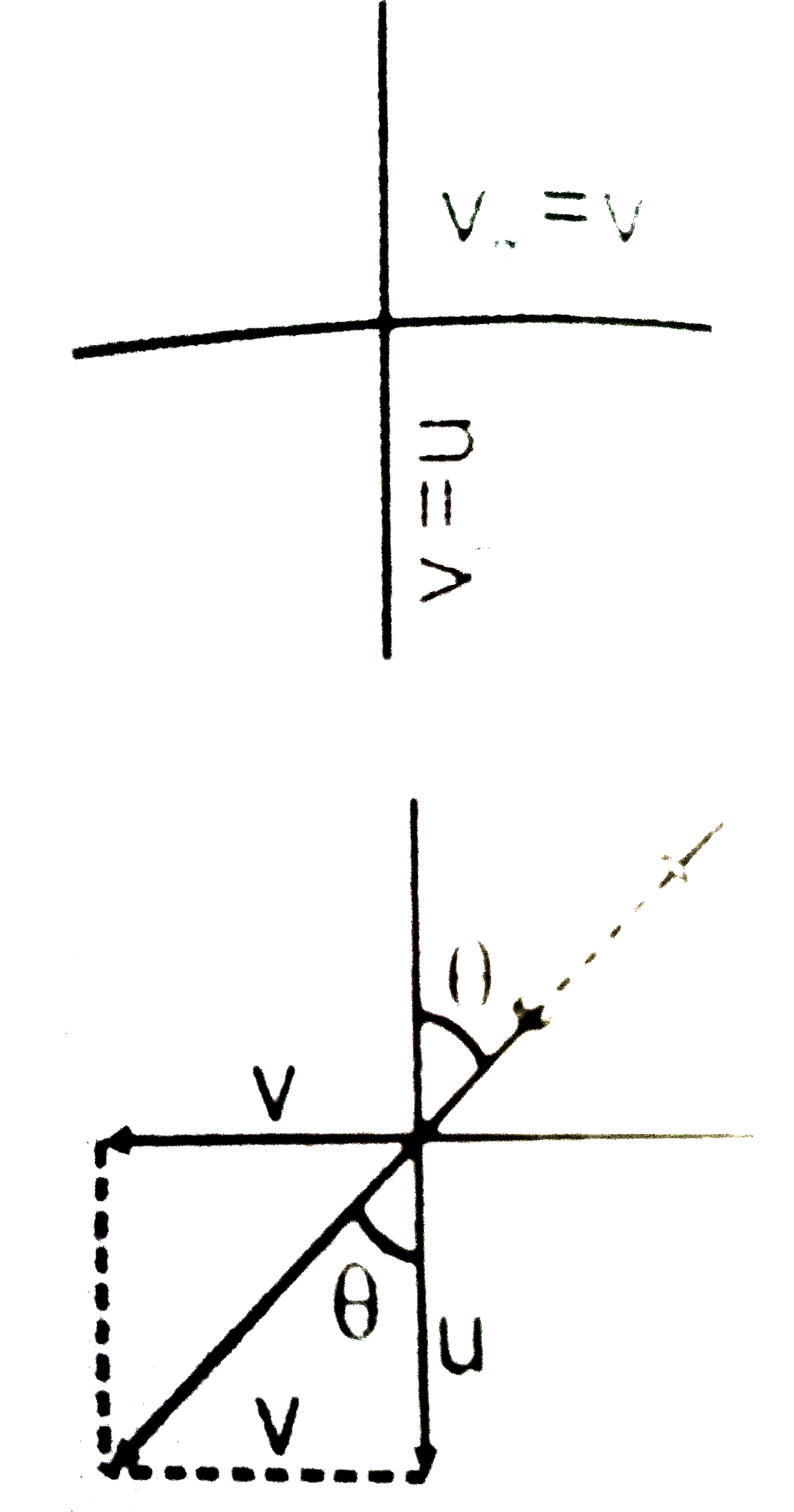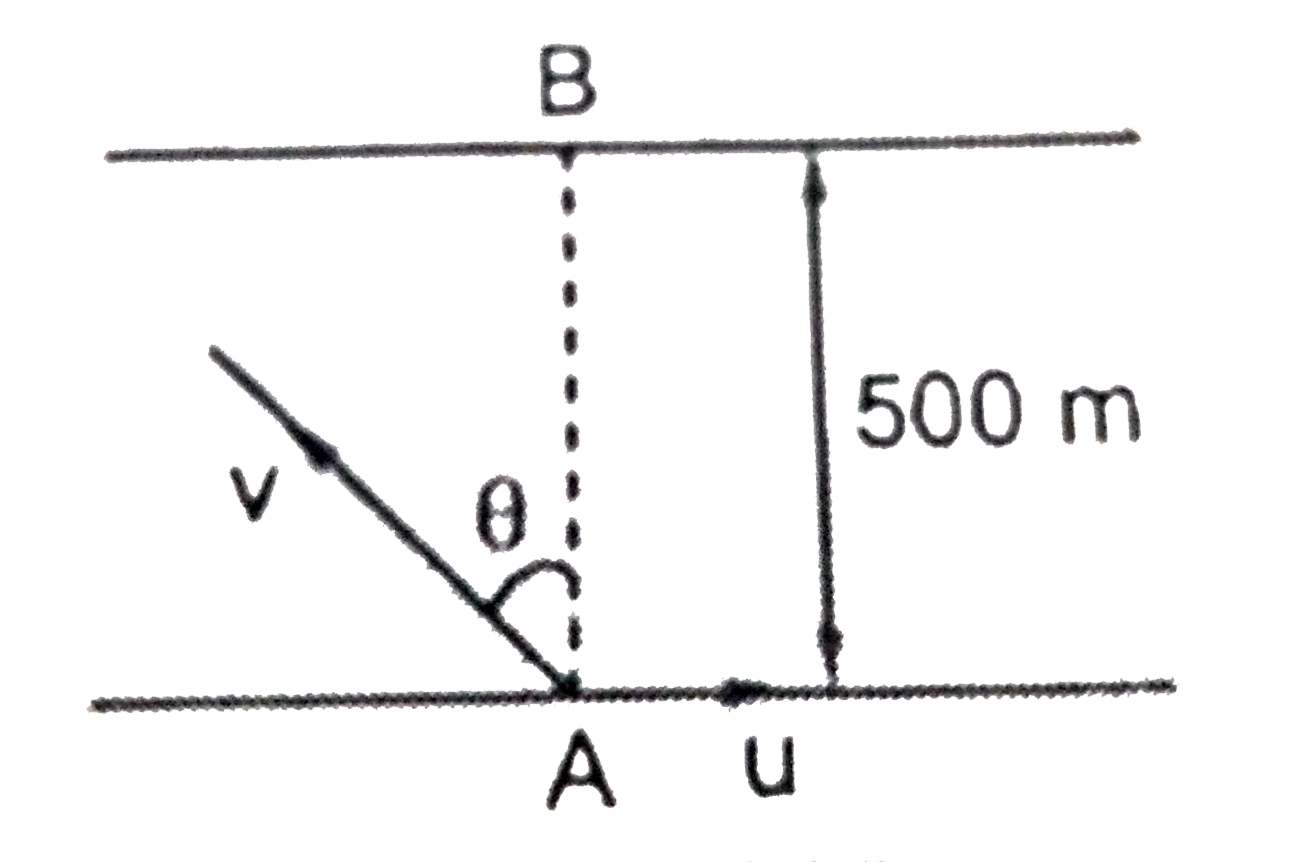A boy is runing on the plane road with velocity v with a long hollow tube in his hand. The water is falling vertically downwards with velocity u. At water angle to the verticaly, he must inclined the tube the water drops enter it without touching its sides ?
tan−1(vu)
sin−1(vu)
tan−1(uv)
cos−1(vu)
The correct Answer is:A
→vrm=→vr−→vm
⇒→vrm=−uˆj−vˆi
⇒tanθ=vu
⇒θ=tan−1(vu)

Topper's Solved these Questions
- MOTION IN A PALNEBOOK - ALLENCHAPTER - MOTION IN A PALNEEXERCISE - EXERCISE-3
41 Videos
- MOTION IN A PALNEBOOK - ALLENCHAPTER - MOTION IN A PALNEEXERCISE - SOLVED EXAMPLE
28 Videos
- MOTION IN A PALNEBOOK - ALLENCHAPTER - MOTION IN A PALNEEXERCISE - EXERCISE-1
99 Videos
- KINEMATICS-2DBOOK - ALLENCHAPTER - KINEMATICS-2DEXERCISE - Exercise (O-2)
48 Videos
- NEWTON'S LAWS OF MOTION & FRICTIONBOOK - ALLENCHAPTER - NEWTON'S LAWS OF MOTION & FRICTIONEXERCISE - EXERCISE (JA)
4 Videos
Similar Questions
A boat moves relative to water with a velocity v which is n times less than the river flow velocity u. At what angle to the stream direction must the boat move to minimize drifting ?
View SolutionA boy is running on a horizontal road with a velocity of 5 m/s. At what angle should he hold his umbrella in order to protect him self from the rain if the rain is falling vertically with a velocity of 10 m/s?
View Solution
Knowledge Check
A man starts running along a straight road with uniform velocity observes that the rain is falling vertically downward. If he doubles his speed, he finds that the rain is coming at an angle θ to the vertical. The velocity of rain with respect to the ground is :
Auˆi−utanθˆjBuˆi−ucotθˆjCuˆi+ucotθˆjDutanθˆi−uˆj27 identical drops of water are falling down vertically in air each with a terminal velocity of 0.15 m/s. If they combine to form a single bigger drop , what will be its terminal velocity?
A0 m/sB1.35 m/sC0.3 m/sD0.45 m/sA swimmer wishes to cross a river 500m width flowing at a rate u. his speed w.r.t. still water is v. for this he makes an angle θ with the vertical as shown in the given figure then:
 Ato cross the river in minimum time θ=0∘Bto cross the river in minumum time, θ=30∘Cfor u=3km/hr and v=5km/hr, the time taken to cross the river in minimum time will be 6min.Dfor u=3 km/hr and v=5km/hr, the time taken to cross the river in minimum time will be 3min.
Ato cross the river in minimum time θ=0∘Bto cross the river in minumum time, θ=30∘Cfor u=3km/hr and v=5km/hr, the time taken to cross the river in minimum time will be 6min.Dfor u=3 km/hr and v=5km/hr, the time taken to cross the river in minimum time will be 3min.
An open water tight railway wagon of mass 5×103kg moves at an initial velocity 1.2m/s without friction on a railway track. Rain drops fall vertically downwards into the wagon. The velocity of the wagon after it has collected103kg of water will be :-
View SolutionA long metal rod of length I and density p is held vertically with its lower end touching sea-water of density p0. Calculate the time in which the whole of the rod will sink into water and the velocity of the rod. Negtect water resistance and assume vertical postion of the rod throughout its motion .
View SolutionAn open watertight railway wagon of mass 5×103kg is moving with an initial velocity of 1.2ms−1 without friction on a railway track. Rain falls vertically downwards into the wagon. What change will occur in the kinetic energy of wagon, when it has colleted 103 kg of water ?
View SolutionAn open water tight railway wagon of mass 5×10(3)kg coats at an initial velocity 1.2m/s without friction on a railway track. Rain drops fall vertically downwards into the wagon. The velocity of the wagon after it has collected103kg of water will be :-
View SolutionTwo indetical spherical drops of water are falling (vertically downwards) through air with a steady velocity of 5cmsec. If both the drops coalesce (combine) to form a new spherical drop, the terminal velocity of the new drop will be (neglect buoyant force on the drops.)
View Solution
